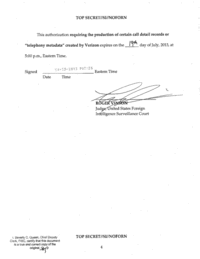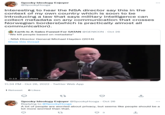2013 NSA Surveillance Scandal
Overview
NSA PRISM Scandal was a political scandal surrounding the United States National Security Agency's data-mining operation of millions of customers from major telecommunications providers across the country, as well as its clandestine electronic surveillance program known as PRISM.
Background
On June 5th, 2013, The Guardian[1] published an exclusive report that the U.S. National Security Agency is collecting the telephone records of millions of customers of Verizon. The article detailed a classified order from the U.S. Foreign Intelligence Surveillance Court, which was obtained by the U.K. daily newspaper and made publicly available on its website[2], directing Verizon's Business Network Services to hand over all "telephony metadata" created by the mobile service provider within the United States and abroad.




Notable Developments
The Guardian's leak of the court document was universally met by criticisms of the Obama administration from both ends of the political spectrum, as well as news media outlets[4][5][8][9][10][11] and civil rights advocacy groups.[12] That same day, the New York Times[7] published an editorial titled "President Obama's Dragnet," slamming the president's abuse of executive power, especially in the light of another recent scandal that the Justice Department secretly monitored the Associated Press and Fox News, and adding that the Obama "administration has now lost all credibility."
Online Reactions
On Facebook, The Guardian's story was shared more than 103,000 times before 2 p.m. (EST) and the story was met by similar reactions of anger, confusion and even a few jokes about Verizon’s “share everything” plan and its ever-so-fitting catchphrase “can you hear me now?” On Twitter, the original story published by The Guardian was shared more than 10,200 times before 10 a.m. (EST) while the hashtag #NSA immediately shot up to the top trending topic of the day, leading to nearly 250,000 mentions in less than 24 hours.
PRISM Program
Also on June 6th, 2013, The Guardian[14] published an article reporting on a previously undisclosed government surveillance program called PRISM, which gives the NSA the power to gain direct access to search history, emails, file transfers and live chats from various Internet services, including those provided by Google, Facebook and Apple. The details of the program were revealed in a leaked PowerPoint presentation, which claimed the program was run with the assistance of the Internet companies involved.


In response to questions about their involvement with the program, each company The Guardian contacted denied any knowledge of PRISM, including Google who released the following statement:
"Google cares deeply about the security of our users' data. We disclose user data to government in accordance with the law, and we review all such requests carefully. From time to time, people allege that we have created a government 'back door' into our systems, but Google does not have a back door for the government to access private user data."
The article noted that the program raised many concerns about due process, as it allows the NSA to directly access company servers to obtain information in complete secrecy. The director of ACLU's Center for Democracy Jameel Jaffer criticized PRISM for being military surveillance of civilians:
"This is unprecedented militarization of domestic communications infrastructure. That's profoundly troubling to anyone who is concerned about that separation."
On June 7th, The Guardian[15] published a follow-up article, reporting that the United States Director of National Intelligence James Clapper confirmed the existence of PRISM, but insisted that it only covered surveillance of communications with foreigners, not United States citizens.
Official Response
That same day, President Barack Obama held a press conference in which he defended the surveillance programs, arguing that they did not apply to United States citizens, were subject to Congressional oversight and required the authorization of federal judges (shown below).[16]
Leaker's Identity Revealed
On June 8th, The Guardian[17] published an interview with Edward Snowden, a former technical assistant for the CIA and employee of the defense contractor Booze Allen Hamilton, who revealed himself as the person responsible for leaking the NSA documents to the press. In the article, he described his early years of career rising through the the ranks of the United States army and Special Forces, where he went on to join the CIA working in technical security. After leaving the CIA, Snowden became an infrastructure analyst contractor at an NSA facility in Hawaii, where he gained access to classified documents detailing the agency’s various surveillance programs. In the interview, Snowden claims he never wished to be an anonymous source and had immediately fled the United States to seek asylum in Hong Kong.
Snowden went on to reveal that he had risked a $200,000 salary, a girlfriend and a home in Hawaii to expose the programs but that he wishes to avoid the media spotlight to keep the public's attention on the surveillance controversy. To avoid being spied on, he lined his hotel room door with pillows and covered his head and laptop while entering passwords. Snowden could potentially be extradited to the United States to be criminally prosecuted but hopes to receive political asylum in Iceland. On June 9th, a petition was created on the White House "We the People" website,[18] calling for the government to grant Snowden a full pardon. Within 24 hours, the petition gained over 19,000 signatures.

XKeyscore Program
On July 31st, 2013, The Guardian[42] released another set of NSA training manuals and presentation slides detailing a data mining program called XKeyscore, which is reportedly capable of collecting every aspect of an internet user's activities, including the content of personal emails, web search history and browsing patterns, as well as their metadata. The Guardian also reported that due to the sheer volume of the data and storage capacity of the system, NSA can only retain the collected data for a short period of time, typically for three to five days, while data from some of the larger websites are stored up to 24 hours. According to the NSA's slideshow presentation[43], by 2008, the data collected by XKeyscore had assisted in detaining 300 terrorists.
![8ec.jpg TOP SECRET/COMINTI/REL TO USA, AUS, CANL GBR NZL What XKS does with the Sessions EYSOO Plug-ins extract and index metadata into tables [sessions]- → [processing engine]--→ (database) € → (user queries) phone numbers tables email addresses full log Session log ins user activity](https://i.kym-cdn.com/photos/images/newsfeed/000/584/120/8ec.jpg)
Citing another top-secret document, The Guardian further described the "wide-ranged" capabilities of XKeyscore, which enables analysts to perform searches within web pages, personal e-mail inboxes and Facebook chat logs, as long as proper justification for the search is provided.
That same day, the details of the XKeyscore program quickly spread to other news and tech sites, including Slashdot[44], PCWorld[45], Gigaom[46], the Verge[47], Slate[48] and the Huffington Post.[49] Salon[50] noted that these documents reaffirm an assertion made by Snowden in his July 10th video interview with the Guardian, during which he revealed that he could “wiretap anyone … if I had a personal email.” Snowden's earlier statement was initially denied by the U.S. House Intelligence Committee chairman Mike Rogers, who claimed that Snowden was lying and that type of wiretapping would be impossible.[51]
Lawsuits Against Phone Metadata Collection
In December of 2013, Judge Richard Leon released a preliminary ruling in Klayman v. Obama that found the NSA's mass collection of phone metadata violated the Fourth Amendment – calling the technology "Orwellian" and dismissing almost every one of the NSA's arguments.
Congress should not be able to cut off a citizen's right to judicial review of [a] Government action simply because it intended for the conduct to remain secret by operation of the design of its statutory scheme. While Congress has great latitude to create statutory schemes like FISA, it may not hang a cloak of secrecy over the Constitution.[53]
However, Judge Leon allowed the program to continue to give the government an opportunity to appeal in light of national security concerns.[61] A three-judge panel in the D.C. Circuit Court of Appeals heard the appeal in November of 2014.[62] The panel reversed the preliminary injunction (essentially, an order staying the metadata collection during the remainder of the case) and returned the case to the District Court for a final determination of the program's legality.[74]
The ACLU filed a separate lawsuit and won on appeal in the Court of Appeals for the Second Circuit on May 7, 2015.[71] The three-judge panel ruled unanimously in the ACLU's favor, and also considered the program "almost-Orwellian." Unlike the Klayman suit, however, the Second Circuit did not address the constitutional question, instead holding that the NSA had exceeded its statutory authorization from Congress and remanded the case to the District Court.[72] Regardless, the case left the NSA's dragnet metadata collection policies in tact, as the Second Circuit declined to dismantle the program despite finding it illegal.[73]
Wikimedia Lawsuit Against "Upstream" Surveillance
On March 10th, 2015, the Wikimedia Foundation filed suit against the NSA in federal court in Maryland, challenging the legality of "Upstream" surveillance.[54] The American Civil Liberties Union (ACLU) is representing Wikimedia and its eight co-plaintiffs, which include The National Association of Criminal Defense Lawyers, Amnesty International USA, Human Rights Watch, and others.[55]
Unlike PRISM, which obtains information directly from U.S. companies that host targeted accounts, Upstream involves "connecting surveillance devices to multiple major internet cables, switches, and routers inside the United States… [and] is not limited to communications sent or received by the NSA’s targets."[56] The complaint asserts that this violates Fourth Amendment protections of privacy, violates the First Amendment due to its chilling effect on speech, and exceeds the NSA's statutory authority under the FISA Amendments Act of 2008.[56]
Numerous outlets have subsequently reported on the lawsuit, including CBS[57], FOX News[58], and Newsmax[59]. HotAir reports that Wikimedia and its fellow plaintiffs may lack standing to proceed with their suit, unless they can prove "that they have actually been damaged by the NSA's activities."[60] However, Wikimedia asserts that disclosures reveal that the NSA "specifically targeted Wikipedia and its users," and thus should have standing.[63][64]
Notable Parodies
Verizon Wireless Ad Parodies
Shortly after The Guardian broke the story on June 6th, BuzzFeed ran an article titled "Help Us Reimagine Verizon Ads," featuring a compilation of image macros parodying the Verizon Wireless advertisements and their well-known slogan "can you hear me now?" In the following days, additional jokes and wordplays centered around Verizon Wireless and its "Share Everything" data subscription plan continued to appear on Twitter, Facebook, Reddit and Tumblr.






Also on the day of the leak, American actor Jason Biggs tweeted a joke referencing Verizon's advertising catchphrase "Can you hear me now?", which received over 330 retweets and 130 favorites in the first 24 hours.
"Can you hear me now?" – Verizon customers"Yep." – The U.S. government
— Jason Biggs (@JasonBiggs) June 6, 2013
Former Republican presidential candidate Herman Cain tweeted a sarcastic statement to Verizon customers, congratulating them on being spied on "without probable cause."
Congratulations, Verizon subscribers! The NSA is spying on you without probable cause! bit.ly/1b8Uuhp
— Herman Cain (@THEHermanCain) June 6, 2013
#NSACalledToTellMe
Other Twitter users began posting jokes about the scandal with the hashtag #NSAcalledtotellme.
#nsacalledtotellme that my choice of DrWho over AmericanIdol was unpatriotic #watchingfordrones
— Nicholas Brown (@nicholasbrown85) June 7, 2013
Obama is Reading Your E-mails
On June 8th, the “Obama is Checking Your Email” Tumblr[29] blog was launched to mock the Obama administration’s involvement in the NSA surveillance scandal, highlighting various photographs of President Obama staring at computer monitors and smart phone screens as if he is spying on private citizens (shown below).






Two days later on June 10th, several news and tech sites highlighted notable examples from the Tumblr blog, including BuzzFeed,[30] The Daily Dot,[31] Mashable[32] and the New York Daily News.[33] The same day, Redditor sligowaths posted a link to the blog on the /r/toosoon[34] subreddit, where it gained upwards of 820 up votes and 40 comments in the first 24 hours.
#NSAKidsBooks
Also on June 8th, Twitter user @Darth[19] asked his followers to submit parody titles of children's books incorporating the NSA's domestic surveillance scandal with the hashtag #NSAKidsBooks.[20] After more than 2,800 mentions of the hashtag over the weekend[21], @Darth used the submissions as his inspiration for a series of children's book cover illustrations. (shown below)

Operation Troll the NSA
On June 10th, BuzzFeed staff writers Chris Baker and Mike Lacher launched a crowdsourced scheme titled "Operation Troll the NSA" with an objective to overload the spy agency's surveillance system by transmitting a scripted email loaded with suspicious keywords en masse and all at the exact same time. The official website TrollTheNSA.com asks its readers to electronically send the scripted message to a friend at 7 p.m. (ET) on June 12th, 2013.

IF MILLIONS OF US, ALL AT THE SAME EXACT TIME, CALL OR EMAIL SOMEONE WITH OUR KEYWORDS-OF-TERROR-FILLED SCRIPT, WE CAN GIVE OUR NATION’S IMPRESSIVE SURVEILLANCE APPARATUS THE KIND OF TEST IT DESERVES. THEY SAY THEY DON’T READ OR LISTEN TO THE CONTENTS OF OUR MESSAGES. WHY NOT TEST IT OUT? IT'LL BE FUN.
Hey! How’s it going? I’m all right.
My job is so shitty I wish I could overthrow my boss. It’s like this oppressive regime where only true believers in his management techniques will stay around. I work marathon-length hours and he’s made all these changes that have made it the worst architecture firm to work at in Manhattan. Like he moved the office to the Financial District and fired my assistant. She was the only one who knew where the blueprints were! I need access to those blueprints to complete my job! F my life, right? And he keeps trying to start all these new initiatives to boost revenue, but seriously we just need to stick to what we do best. There’s only one true profit center. I seriously feel ready to go on strike at any second.
I just read this article about how these free radical particles can cause the downfall of good health and accelerate aging. These could actually cause death to millions of Americans. If these particles are flying around undetected everywhere, does that mean we’re all radicalized?
Have you seen the second season of Breaking Bad? I just finished it. I couldn’t believe that episode where they poison the guy with ricin! That was the bomb! I won’t say any more because I don’t want to reveal the earth-shattering events to come.
Oh! So I’ve been planning a big trip for the summer. I’m thinking of visiting all of the most famous suspension bridges in the United States. So probably like the Golden Gate Bridge, The Brooklyn Bridge, and the Verrazano Narrows Bridge. I’m gonna bring my younger brother and I know he’ll want to go to bars, so I’m thinking of getting him a fake drivers license, but I hope that doesn’t blow up in my face.
Okay, I gotta run! I’m late for flight school. I missed the last class where we learn how to land, so I really can’t miss another one. Talk to you later!
PRISM Slideshow Redesign
On June 11th, a few days after the Washington Post's publication of the PRISM slideshow, Paris-based freelance designer Emiland De Cubber uploaded a slideshow file titled "Dear NSA, let me take care of your slides," revamping nearly every aspect of the top-secret Powerpoint presentation to modern standards in visual communications design. Within the first 24 hours, Cubber's slideshow gained more than 412,800 views on Slideshare (shown below).[24]








According to Cubber[25], he initially took notice of the PRISM slideshow through a tweet mocking the poor sense of design posted by American data theorist Edward Tufte.
Dreadful spy-PRISM deck sets new record for most header logos per slide: 13 washingtonpost.com/wp-srv/special… #powerpoint #ppt twitter.com/EdwardTufte/st…
— Edward Tufte (@EdwardTufte) June 7, 2013
Obama "Hope" Poster Parodies
See also: Obama "Hope" Poster




Parody Accounts
Throughout June, several parody accounts impersonating NSA agents and Edward Snowden were launched, including @Prism_NSA and @EJosephSnowden (defunct) on Twitter, as well as a handful of humorous bots and novelty accounts on Reddit, some of the more notable examples being NSABot, Silent_NSA_Notetaker, Quiet_NSA_Notetaker, Totally-Not-The-NSA, Not-A-NSA-Agent and NSA-PRISM.
![fad.jpg This is what I think every time I hear about the NSA surveillance. (Simpsons) 2265 submitted 7 hours ago by lamemodem + 78 comments share source save hide report hide all child comments sorted by: top▼ navigate by: submitter | moderator | friend I me | admin | IAmA images | popularnew you are viewing a single comment's thread. view the rest of the comments → 个 ausavin26 ei 40 points 3 hours ago (4717) What if the producers of The Simpsons knew about the NSA spying on us the whole time? permalink source report give gold save-RES reply hide child comments 个[-] Silent-NSA,Notetaker [+2] 73 points 2 hours ago (99126) permalink source parent report save-RES give gold reply](https://i.kym-cdn.com/photos/images/newsfeed/000/560/042/fad.jpg)
Edward Snowden
See also: Edward Snowden






Advice Animals









NSA False Alarm Trigger
On June 28th, VICE's tech news blog Motherboard released "Hello, NSA," a web-based application that randomly generates a sentence with multiple keywords known to be monitored by the Department of Homeland Security's National Operations Center, which were listed in the "Analyst's Desktop Binder" document publicly released in 2011.

NSA Gift Exchange
On July 1st, Reddit's gift exchange hub announced the launch of "The NSA Gift Exchange," a special gift exchange program inspired by Motherboard's "Hello NSA." During the course of the event, each participant must find and send a novelty gift using a list of 10 NSA-monitored keywords handpicked by an anonymous sender as the guideline. In turn, the participant would receive a gift that is similarly chosen based on the list of choice keywords.

Yahoo Court Battle
On July 15th, 2013, Electronic Frontier (EFF) Foundation activist Parker Higgins posted a tweet announcing that a secret court had ordered the United States Department of Justice to release documents that would show Yahoo resisted complying with the NSA's PRISM program.
Secret surveillance court orders the DOJ to review a secret Yahoo opinion for declassification https://t.co/Exur5wVaVc
— Parker Higgins (@xor) July 15, 2013
The same day, the EFF[37] published a blog post awarding Yahoo a "gold star" as part of the organization's "Who Has Your Back"[41] campaign for protecting online privacy and freedom (shown below). Also on July 15th, the Internet news site The Daily Dot[38] published an article about the ruling, which was subsequently posted to the /r/news[39] subreddit. Within 22 hours, the post gained over 5,500 up votes and 200 comments.

Facebook's SEC Silence
On the same day, The Daily Dot[40] published an article about Facebook's silence about PRISM with the Securities and Exchange Commission (SEC), noting that companies are required to disclose all risks to shareholders when making a public filing due to the Securities Act of 1933. On July 29th, 2013, Facebook's Chief Privacy Officer Erin Egan participated in a video Q&A[52] (shown below) where she strongly denied Facebook allowed anyone to directly access their servers.
Fight 215
On April 5th, 2015, the late night talk show Last Week Tonight with John Oliver aired a segment about provisions in the United States Patriot Act[70] which were set to expired in June, which singled out Section 215 for allowing the NSA to collect the phone records of millions of United States citizens who had not been suspected or accused of crime (shown below).
On February 8th, the Electronic Frontier Foundation launched the website Fight215.org[65] along with a promotional video for the campaign, which asks viewers to call their elected representatives in Congress and urge them to allow Section 215 to expire during a vote held on June 1st. On the following day, Redditor johnmountain submitted the campaign site to the /r/technology[66] subreddit, where it gained over 3,700 votes (95% upvoted) and 770 comments in the first seven hours. In the coming days, several news sites published articles about Fight 215, including RT,[67] The Hill[68] and International Business Times.[69]
Search Interest
External References
[1] The Guardian – NSA collecting phone records of millions of Verizon customers daily
[2] The Guardian – Verizon forced to hand over telephone data – full court ruling
[3] New Yorker – A LETTER TO VERIZON CUSTOMERS
[4] New Yorker – THE N.S.A.-VERIZON SCANDAL
[5] Google News – Stories about NSA-Verizon Scandal
[6] BuzzFeed – Help Us Reimagine Verizon Ads
[7] New York Times – President Obama’s Dragnet
[8] Washington Post – Obama administration collecting huge number of citizens’ phone records, lawmaker says
[9] Politico – Left, right radio fume at NSA report
[10] Washington Post – U.S. intelligence mining data from nine U.S. Internet companies in broad secret program
[11] Los Angeles Times – NSA, Verizon surveillance program: What you need to know
[12] Electronic Frontiers Foundation – Timeline of NSA Domestic Spying
[13] USA Today – Report: NSA siphons data from 9 major Net firms
[14] The Guardian – NSA PRISM program taps in to user data of Facebook Yahoo and others
[15] The Guardian – Clapper admits secret NSA surveillance program to access user data
[16] The New York Times – Obama Calls Surveillance Programs Legal and Limited
[17] The Guardian – Edward Snowden the whistleblower behind the NSA surveillance revelations
[18] White House – Pardon Edward Snowden
[19] Twitter – @Darth's Twitter Feed
[20] Twtter – Search Results for #NSAKidsBooks
[21] Topsy – Mentions of #NSAKidsBooks
[22] The Guardian – NSA surveillance as told through classic children's books
[23] Washington Post – NSA slides explain the PRISM data-collection program
[24] Slideshare – Dear NSA, let me take care of your slides
[25] Fasco Design – A Designer Overhauls The NSA’s Atrocious Powerpoint Presentation
[26] TrollTheNSA.com – LET'S JAM UP THE NSA'S SCANNERS
[27] The Huffington Post – 'Troll The NSA' Hopes To Get Lots Of People To Send Keyword-Filled Email At The Same Time
[28] Roll Call – NSA Is ‘Aware’ of Impending Trolling
[29] Tumblr – Obama is Checking Your Email
[30] BuzzFeed – Photos of Obama Reading Your Email
[31] Daily Dot – Obama is reading your email and LOLing about it
[32] Mashable – Obama is checking your email tumblr mocks NSA surveillance program
[33] NY Daily News – Tumblr spoof page Obama Is Checking Your Email goes viral
[34] Reddit – Obama is checking your email
[35] Motherboard – Hello, NSA
[36] RedditGifts – Now Sharing Absurdity – The NSA Gift Exchange
[37] EFF – Yahoos Fight for its Users in Secret Court Earns the Company Special Recognition
[38] The Daily Dot – Yahoo wins court order to release records of its fight against PRISM
[39] Reddit – Yahoo wins court order to release records of its fight against PRISM
[40] The Daily Dot – Facebook Silence on PRISM could result in legal action
[41] EFF – Who Has Your Back
[42] The Guardian – XKeyscore: NSA tool collects 'nearly everything a user does on the internet'
[43] . The Guardian – XKeyscore presentation from 2008 – read in full
[44] Slashdot – Training Materials for NSA Spying Tool "XKeyScore" Revealed
[45] PCWorld – The Guardian: NSA’s XKeyscore program has nearly limitless access to all Internet activity
[46] Gigaom – XKeyscore program indexes everyday internet activities, Snowden documents show
[47] The Verge – NSA XKeyscore database tracks email, Facebook chats, and more, new documents show
[48] Slate – Greenwald's Latest: XKeyscore, NSA's "Widest-Reaching" Internet Intel Program
[49] The Huffington Post – NSA Program, XKeyscore, Allows Wide-Reaching Online Data Collection: Report
[50] Salon – New Snowden leak: NSA program collects all online activity
[51] The Hill – NSA leaker Snowden is lying, say leaders of House Intelligence Committee
[52] Facebook Talks Live – Ask the (CPO) Chief Privacy Officer
[53] The Guardian – Full Text of the Court Ruling.
[54] The New York Times – Stop Spying on Wikipedia Users.
[55] ACLU – Wikimedia v. NSA: Challenge to Mass Surveillance Under the FISA Amendments Act.
[56] ACLU – Complaint for Declaratory and Injunctive Relief.
[57] CBS – Wikipedia Suing NSA Over Spying.
[58] FOX News – Wikipedia is Suing the NSA for its Mass Surveillance Program.
[59] Newsmax – Wikipedia Lawsuit on NSA Surveillance Filed by ACLU.
[60] HotAir – Wikipedia Files Lawsuit Against the NSA.
[61] The New York Times – Judge Questions Legality of N.S.A. Phone Records.
[62] Associated Press – Appeals court takes on NSA surveillance case.
[63] TIME – Wikipedia Sues NSA Over Mass Surveillance Program.
[64] Wikimedia Blog – Wikimedia v. NSA: Wikimedia Foundation files suit against NSA to challenge upstream mass surveillance.
[67] RT – Fight 2156 coalition unveils campaign to end Patriot Act spy law
[68] The Hill – New Anti-NSA Coalition
[69] International Business Times – Patriot Act
[70] Wikipedia – Patriot Act
[71] The Hill – Top federal court rules against NSA's phone records program
[73] The Hill – No changes at NSA after Court ruling
[74] The Wall Street Journal – Read the Ruling: Appeals Court Reverses on NSA Phone Surveillance





















Top Comments
VitaminD
Jun 07, 2013 at 04:11PM EDT
Zer0
Jun 06, 2013 at 09:20PM EDT